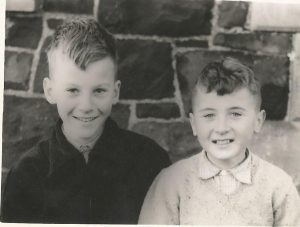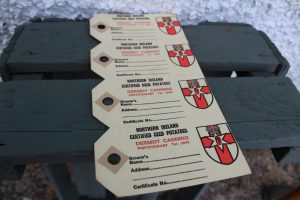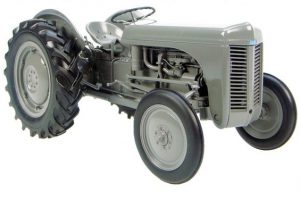 My family moved to Maghera in August 1958, when we were allocated a bungalow in Crawfordsburn Drive. My grandparents were already resident in Crawfordsburn at the time and my association with the town of Maghera and Crawfordsburn began perhaps before I was a year old. By the time we moved ourselves, I was six years old, the youngest in the family.
My family moved to Maghera in August 1958, when we were allocated a bungalow in Crawfordsburn Drive. My grandparents were already resident in Crawfordsburn at the time and my association with the town of Maghera and Crawfordsburn began perhaps before I was a year old. By the time we moved ourselves, I was six years old, the youngest in the family.
In those days we were given time off school in October, known as ‘the potato gathering holiday,’ (Nowadays it is known as the mid-term break.). This provided an opportunity for us children to participate in the potato harvest – that is, those of us who were willing to take up the challenge and earn some extra pocket money in the process. It was not to the liking of everyone, and I cannot recall ever having gathered potatoes with my great friend John Kennedy, for instance.
On my first day in the field I was gathering for a fair-minded man called Willie Paul. The work was steady throughout the day, and with the approach of evening, Willie duly decided it was quitting time. I received from him the much-loved, and later greatly missed, little ten-bob-note. To put this into perspective, my pocket money at the time would have been one shilling, while a quality bar of chocolate would have cost sixpence. This was the first time in my life that I had earned any money and I arrived back in Maghera, after walking home with my friends, a proud boy. I decided to buy a present for my mother and purchased a small bottle of perfume for 1/6 in Bobby Martin’s Chemist shop, which left me with 8/6 – a small fortune to me.
 Conditions varied greatly from farm to farm. I can recall gathering at a farm on the verge of the town on the station road with my good friend Mervyn Cochrane and other children. This was one of the hardest day’s work we ever did. I can remember gathering to meet Mervyn and the large amount of potatoes lying between us. We had to go to the house to be paid, with the two of us receiving ten shillings but with some of the younger children receiving considerably less than this, perhaps as little as five shillings. This caused a bit of a stir when some of the youngsters arrived home, with one or two of the mothers considering going to the house to protest but then, I think, they decided to grudgingly accept it.
Conditions varied greatly from farm to farm. I can recall gathering at a farm on the verge of the town on the station road with my good friend Mervyn Cochrane and other children. This was one of the hardest day’s work we ever did. I can remember gathering to meet Mervyn and the large amount of potatoes lying between us. We had to go to the house to be paid, with the two of us receiving ten shillings but with some of the younger children receiving considerably less than this, perhaps as little as five shillings. This caused a bit of a stir when some of the youngsters arrived home, with one or two of the mothers considering going to the house to protest but then, I think, they decided to grudgingly accept it.
I began to take a keen interest in angling while still a small boy, fishing in and around the town with the wee Mullagh River, between the Milltown Road and the Tobermore Road, being a favourite location. On one occasion, I can remember we were gathering in a large field immediately beside the Moyola River, in the townland of Ballinhone, where the work was steady and there was not much scope to take in our surroundings. Despite the heavy work, I took every chance I could to head over the bank where I could study the river, wondering what it would be like to try my luck there. I had to go carefully and keep a watch out so as not to be guldered at or to be seen as losing interest in what I was there to do.
I was keen to gather potatoes during these years, even doing so after school, walking down the Mullagh Road with my good friend William Anderson to work on Marshal’s farm. It would have been common at that time for the farmers to have cruised about Crawfordsburn on a Friday night booking gatherers for the next day. If we were heading out into the country to a farm, getting to and from the field was, on occasion, verging on the comical. I was often amazed at how many gatherers could be transported safely in the back of a mini-van.
We gathered the potatoes into a large wooden creel, which two of us could lift, moving it forward of the potatoes yet to be gathered. It was wise to take time to scrape the muck off it as we worked, keeping it as light as possible. If the potatoes were being transferred from the creel to the bag that would have been the wrong time to share a joke, as this could have meant the potatoes toppling down the side of the bag instead of into it!
The small grey Massey Ferguson tractor was popular amongst the farming community in Maghera at that time – even for taking the wife into town to do a bit of shopping. This tractor, with a digger attached, dug the potatoes for us to gather. Once a drill had been dug, if the farmer was in no great hurry,  he waited until we had gathered it all before digging the next one. This allowed us to have a short break before resuming work. Alternatively, if the farmer was in a more determined mood, he would have been digging the next drill while we were still gathering the previous one, what we would have referred to as ‘digging two ways’. This, of course, meant no break for us between one drill and the next.
he waited until we had gathered it all before digging the next one. This allowed us to have a short break before resuming work. Alternatively, if the farmer was in a more determined mood, he would have been digging the next drill while we were still gathering the previous one, what we would have referred to as ‘digging two ways’. This, of course, meant no break for us between one drill and the next.
I previously mentioned about the difference in conditions from farm to farm – a difference I still remember to this day. One pleasant day still stands out in my mind, I was gathering for Linton in the townland of Grillagh, and we were gathering ‘blues’. The pace was leisurely and the countryside was peaceful. As we gathered the potatoes they were placed in a heap forming a neat line. They were then protected from the weather by soil and straw. This process was known as pitting. The ‘blue’ potato was well liked and more common at that time than it is today – rather like a plain white unsliced loaf with a hard top and no wrapping paper! It was good to eat and, not being too small, easier to gather. In the middle of the day the woman of the house brought the food to the field in a large basket. I can remember so well the delicious egg and onion sandwiches we had that day along with the good strong mug of tea. It was almost like having a picnic. I received twelve shillings and sixpence for that day’s work. For a young gatherer like myself this was as good as it got.
The face of the countryside has, of course, changed greatly since my childhood, in particular in relation to the development of land for housing and the use of pesticides in farming. There were four fields that lay between the Drive and a small wood where we would go to build a tree hut or even light a campfire to cook an al fresco meal. We played football in the first field beside the drive. Then, going through the hedge into the second field, I could run downhill with the dogs towards the stream that divided it from the next field on. The excitement would build as we went on further and approached the wood that was like our own private playground.
Memories linger of walking along the side of a field, past the slowly ripening barley gently ripening in the summer breeze, of sticklebacks in the tiny stream that was little more than a trickle, of the surprise of finding frogspawn in what was little more than a puddle and, overall, the evocative call of the hidden cuckoo.
I look back on my time in the fields and townlands of Maghera helping to bring in the harvest with great affection. So here’s to the dear little town. I hope it will prosper and I wish the society every success.
